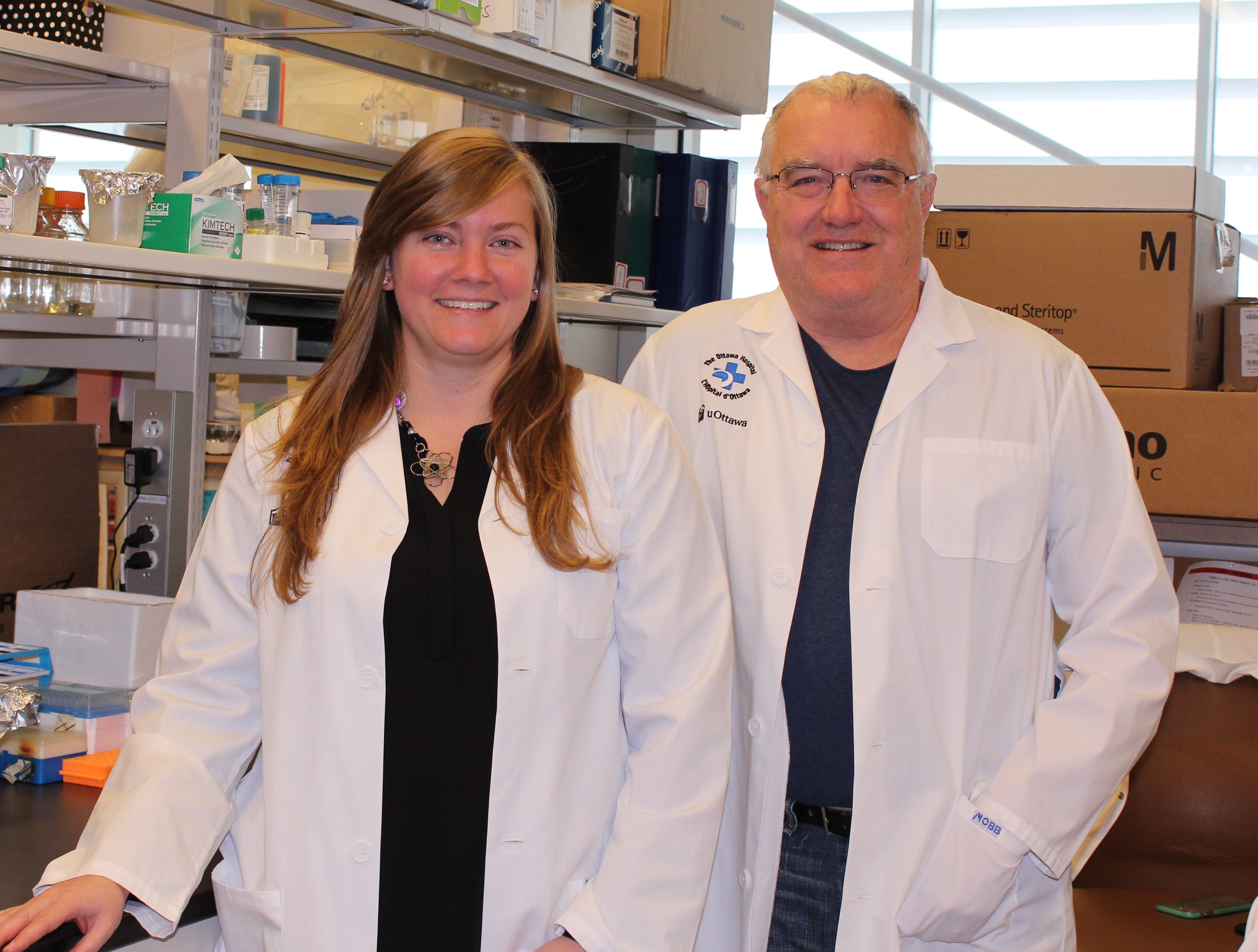 Dr. Marie-Claude Bourgeois-Daigneault of CHUM Research Centre (left) and Dr. John Bell of The Ottawa Hospital and uOttawa (right) led a team that developed a promising new approach for a personalized anti-cancer vaccine in mice. Photo taken pre-COVID.Treatments for cancer are becoming increasingly personalized, not just to a type of cancer, but even to an individual patient. A new study led by Dr. John Bell and his former postdoctoral fellow Dr. Marie-Claude Bourgeois-Daigneault successfully applies this strategy in a new way in mouse models.
Dr. Marie-Claude Bourgeois-Daigneault of CHUM Research Centre (left) and Dr. John Bell of The Ottawa Hospital and uOttawa (right) led a team that developed a promising new approach for a personalized anti-cancer vaccine in mice. Photo taken pre-COVID.Treatments for cancer are becoming increasingly personalized, not just to a type of cancer, but even to an individual patient. A new study led by Dr. John Bell and his former postdoctoral fellow Dr. Marie-Claude Bourgeois-Daigneault successfully applies this strategy in a new way in mouse models.
Their strategy combines oncolytic (cancer-fighting) viruses with a personalized vaccine made from mutated proteins encoded by individual tumours. These mutated proteins (referred to as the mutanome) can easily be made in the lab after sequencing and comparing DNA from a patient’s tumour with DNA from their normal tissue.
The study, published in Nature Communications, shows that this strategy slows tumour growth and improves long-term survival in two kinds of cancer in mice, using four different oncolytic viruses.
While other studies and clinical trials are evaluating mutanome vaccines and oncolytic viruses separately, this is the first study to combine the two. It offers an easy way to personalize oncolytic virus therapy without needing a different virus for each patient.
“Most cancer drugs are meant to treat thousands or millions of patients, but this strategy would allow us to develop a unique therapy for each individual patient,” said Dr. John Bell, senior scientist at The Ottawa Hospital, professor at the University of Ottawa and Scientific Director of BioCanRx.
Authors: Roy DG, Geoffroy K, Marguerie M, Khan ST, Martin NT, Kmiecik J, Bobbala D, Aitken AS, de Souza CT, Stephenson KB, Lichty BD, Auer RC, Stojdl DF, Bell JC, Bourgeois-Daigneault MC.
Funding: This study was supported by the Canadian Institute for Health Research, the Terry Fox Foundation, the Canadian Cancer Society Research Institute, the Ontario Institute for Cancer Research, the Ottawa Regional Cancer Foundation, The Ottawa Hospital Foundation, BioCanRx, the Alliance for Cancer Gene Therapy, Institut du cancer de Montréal, Fonds de Recherche Québec-Santé and Fondation Québécoise du Cancer du Sein.
The Ottawa Hospital is a leading academic health, research and learning hospital proudly affiliated with the University of Ottawa. All researchers at The Ottawa Hospital follow a Responsible Innovation framework for developing and commercializing innovations in a responsible way. Researchers involved in this study hold several patents related to this work and have founded a company to move their research forward.
Media contact
Jennifer Ganton
Director, Communications and Public Relations
Ottawa Hospital Research Institute
613-614-5253
jganton@ohri.ca
